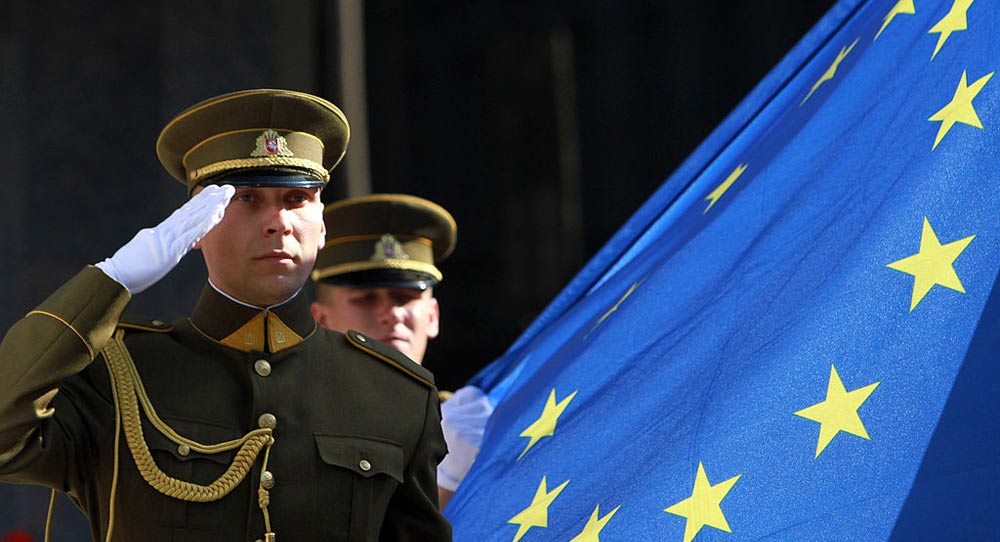A wave of defense euphoria is sweeping Europe. It started about a year ago after the UK’s vote to leave the EU and the publication of the EU global strategy, and increased with the elections of U.S. President Donald Trump and French President Emmanuel Macron. The European project could be relaunched via reinforced defense integration, the idea goes. Migration and economic questions are too controversial to broach, but defense matters to all Europeans, especially since Russia and the self-proclaimed Islamic State reminded them that Europe cannot take security and defense for granted.
Over the last year, political rhetoric and ideas on how to improve the EU’s defense setup have flourished. As a result, new acronyms appeared: a military planning and conduct capability (MPCC), a sort of European headquarters; a coordinated annual review of defense (CARD); a European defense fund (EDF) to finance developments of prototype military kits; and permanent structured cooperation (PESCO), which allows groups of willing EU members to advance more quickly in defense cooperation.
What is more, the European Commission, traditionally not involved in this field, is tipping its toes into defense, bringing its financial tools to the table and broadening the narrow focus from the EU’s Common Security and Defense Policy (CSDP) to a broader idea of EU defense.
Yet, this EU defense honeymoon is misleading, for three reasons.
First, the EU has so far had no role in defense and deterrence in the narrow sense of militarily protecting territories, populations, and political systems. In its global strategy, the EU recognizes that collective defense remains with NATO but calls for European defense and strategic autonomy. Put mildly, this is constructive ambiguity. Europeans have different understandings of defense: for Germany, the topic above all implies collective defense in the East, while France is more into forward defense in Africa—what other Europeans would consider security and crisis management.
Europeans need to agree what tasks they want the EU to carry out. Calling for a security role for the union might be more realistic than calling for a defense role, because for many Europeans, this smacks of questioning NATO—which remains too powerful as U.S.-supported life insurance (at least for now). Indeed, current initiatives might allow EU members to improve their capabilities, but they might not be able to nudge states to use those capacities in an EU framework. The union seems to be developing into a defense facilitator rather than an actor.
Second, the current hype seems to ignore well-known obstacles. Europe does not lack ambitions or institutions, but implementation. Most of the current ideas have been around for years without leading anywhere. This is due to the persistence of nationalist reflexes, diverging strategic cultures, a lack of consensus about EU defense ambition, the scale of the challenges in Europe’s neighborhoods, and NATO.
And there is another, even bigger obstacle: differing motivations. Whereas countries like France seem to be interested in developing and using defense capabilities, Germany appears more interested in keeping the European house together. Others support the current dynamic by default: some Central Europeans either cannot participate in the next integration steps (the euro) or do not want to (migration). If they do not want to be left behind, there is just one area of cooperation left—defense. Yet, the long-term commitment to a policy chosen by default rather than by conviction tends to be limited.
But the main problem is that the current defense dynamism translates above all into institutions, technical details, and processes but avoids the political question: What incentive can the union offer its members to redefine sovereignty—the capacity to decide and act autonomously—and bind themselves in mutual dependence?
Essentially, the new defense hype is about abandoning and redefining sovereignty at the EU level, such as when states are called on to synchronize national defense-planning cycles. It is about giving up the little sovereignty states have left in defense for a greater good: jointly building a larger European capacity to act, to successfully manage real-world problems. Yet, strengthening EU defense in this way requires states to recognize that they have become powerless to address today’s challenges on their own, and that almost all the security problems they face are effectively approached only through cooperation.
In practice, states have no choice between embedding themselves into frameworks such as the EU and standing alone. Just imagine a country engaging Russia or the Islamic State by itself. However, most EU states have an old-fashioned understanding of sovereignty that is not about being able to act effectively but about having the last word—even if this prevents the development of a joint European military or political capability that could address their problems. States prefer national autonomy over joint power.
Governments argue that they cannot entirely trust their partners. They fear being left alone in an operation if a partner decides to withdraw or being unable to engage in a mission in case a partner decides not to participate. However, over twenty years of experience of NATO and EU operations invalidates the fear of these traps. Cooperation has been daily business from Bosnia and Herzegovina to NATO’s enhanced forward presence. Moreover, EU states depend on defense industries: they put their sovereignty in the hands of actors that act for profit but then do not always trust partners that agree on a common objective.
Therefore, the future of European defense depends on whether Europeans can develop an understanding of sovereignty that enables them to compromise on their autonomy, make the most of their mutual dependence, and thereby create a joint capacity to act. If EU states cannot agree to manage their interdependence through the union, then EU defense is likely to die silently—while the talk about it will be as loud as ever.
Claudia Major is a senior associate for international security at the German Institute for International and Security Affairs (SWP) and a member of Women in International Security (WIIS) Berlin.


.jpg)
.jpg)


